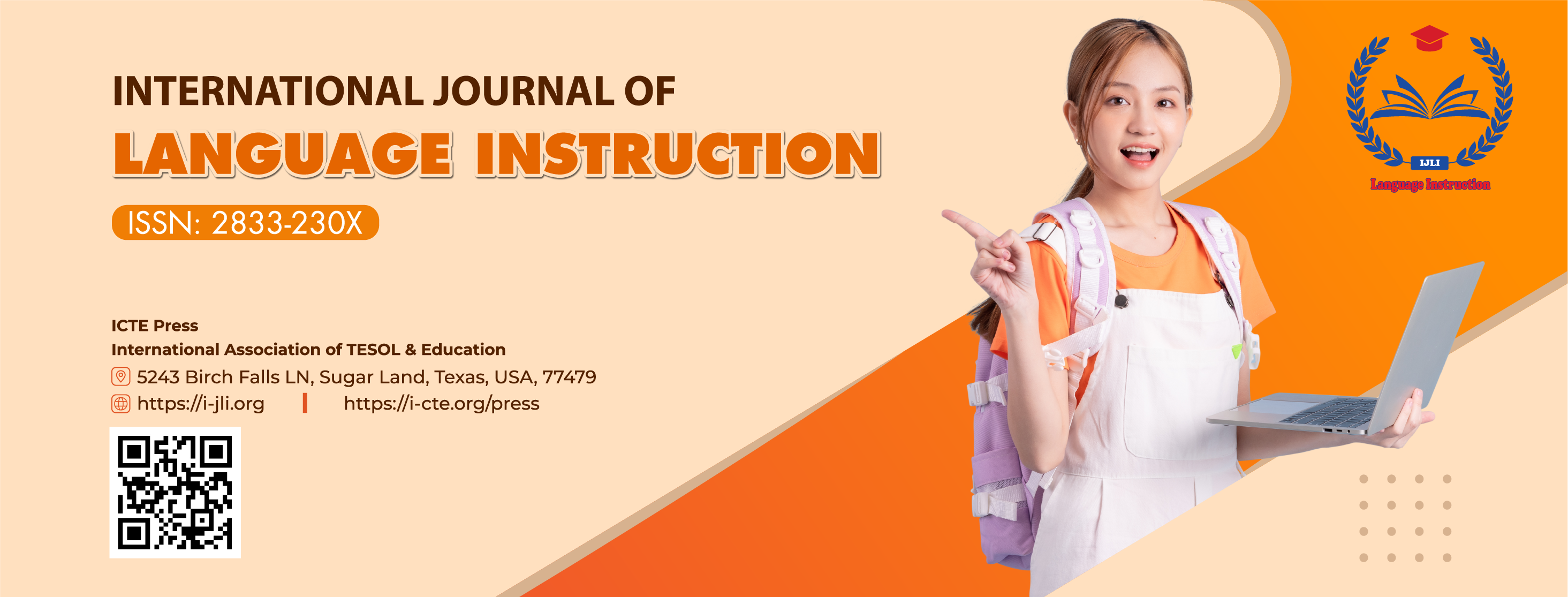ChatGPT in Language Learning: Perspectives from Vietnamese Students in Vietnam and the USA
DOI:
https://doi.org/10.54855/ijli.24325Keywords:
AI Tools, ChatGPT, perspectives, language learningAbstract
The purpose of this study is to explore the students' perspectives on the use of ChatGPT to support their language learning. The current study collects data from 77 Vietnamese students who pursued their studies at some universities in Vietnam and the United States. The questionnaire was designed with Microsoft Forms and sent to the students via personal connections in both countries. The study found that ChatGPT or A.I. Chatbot was positively viewed as a useful tool for facilitating language learning. Moreover, ChatGPT was found to help engage the students in the learning process and was seen as an effective tool to support their learning and enhance their knowledge. However, over-alliance with ChatGPT might limit the students' critical thinking and creativity. To minimize these drawbacks, a compromise between ChatGPT and conventional teaching methods should be used. The current study suggests educators employ ChatGPT or AI tools to innovate language teaching and research.References
Ali, M. A. (2023). An Intervention Study on the Use of Artificial Intelligence in the ESL Classroom: English teacher perspectives on the Effectiveness of ChatGPT for Personalized Language LearningEn. Retrieved from https://www.diva-portal.org/smash/record.jsf?pid=diva2%3A1774035&dswid=7584
Barrett, A., & Pack, A. (2023). Not quite eye to A.I.: student and teacher perspectives on the use of generative artificial intelligence in the writing process. International Journal of Educational Technology in Higher Education, (20), 61. https://doi.org/10.1186/s41239-023-00427-0
Dwivedi, Y. K., Kshetri, N., Hughes, L., Slade, E. L., Jeyaraj, A., Kar, A. K., ... & Wright, R. (2023). "So what if ChatGPT wrote it?" Multidisciplinary perspectives on opportunities, challenges and implications of generative conversational A.I. for research, practice and policy. International Journal of Information Management, 71, 102642. https://doi.org/10.1016/j.ijinfomgt.2023.102642
Flanigan, A. E., & Babchuk, W. A. (2022). Digital distraction in the classroom: exploring instructor perceptions and reactions. Teaching in Higher Education, 27(3), 352-370. https://doi.org/10.1080/13562517.2020.1724937
Halaweh, M. (2023). ChatGPT in education: Strategies for responsible implementation. Contemporary Educational Technology, 15(2), ep421. https://doi.org/10.30935/cedtech/13036
Ho, P. X. P. (2024). Using ChatGPT in English Language Learning: A Study on I.T. Students' Attitudes, Habits, and Perceptions. International Journal of TESOL & Education, 4(1), 55-68. https://doi.org/10.54855/ijte.24414
Huang, W., Hew, K. F., & Fryer, L. K. (2022). Chatbots for language learning—Are they really useful? A systematic review of chatbot‐supported language learning. Journal of Computer Assisted Learning, 38(1), 237-257. https://doi.org/10.1111/jcal.12610
Karataş, F., Abedi, F. Y., Ozek Gunyel, F., Karadeniz, D., & Kuzgun, Y. (2024). Incorporating A.I. in foreign language education: An investigation into ChatGPT's effect on foreign language learners. Education and Information Technologies, 1-24. https://doi.org/10.1007/s10639-024-12574-6
Kohnke, L. (2023). L2 learners' perceptions of a chatbot as a potential independent language learning tool. International Journal of Mobile Learning and Organisation, 17(1-2), 214-226. https://doi.org/10.1504/IJMLO.2023.128339
Javaid, M., Haleem, A., Singh, R. P., Khan, S., & Khan, I. H. (2023). Unlocking the opportunities through ChatGPT Tool towards ameliorating the education system. BenchCouncil Transactions on Benchmarks, Standards and Evaluations, 3(2), 100115. https://doi.org/10.1016/j.tbench.2023.100115
Japoshvili-Ghvinashvili, M., & Suleman, N. (2023). Assisting ELT Teachers: Designing Activities for the Use of ChatGPT in Teaching and Learning. Pakistan Journal of Multidisciplinary Innovation, 2(1), 24-35. https://doi.org/10.59075/pjmi.v2i1.219
Lodge, J. M., Thompson, K., & Corrin, L. (2023). Mapping out a research agenda for generative artificial intelligence in tertiary education. Australasian Journal of Educational Technology, 39(1), 1–8. https://doi.org/10.14742/ajet.8695
Mai, D. T. T., Da, C. V., & Hanh, N. V. (2024, February). The use of ChatGPT in teaching and learning: a systematic review through SWOT analysis approach. Frontiers in Education,9, 1-17. https://doi.org/10.3389/feduc.2024.1328769
Murphy, R. F. (2019). Artificial intelligence applications to support K-12 teachers and teaching. Rand Corporation, 10, 1-20. https://doi.org/10.7249/PE315
Marzuki, Widiati, U., Rusdin, D., Darwin, & Indrawati, I. (2023). The impact of A.I. writing tools on the content and organization of students' writing: EFL teachers' perspective. Cogent Education, 10(2), 2236469. https://doi.org/10.1080/2331186X.2023.2236469
Neji, W., Boughattas, N., & Ziadi, F. (2023). Exploring new AI-based technologies to enhance students'motivation. Issues in Informing Science & Information Technology, 20, 95-110. https://doi.org/10.28945/5149
Nguyen, T. T. H. (2023). EFL Teachers' Perspectives toward the Use of ChatGPT in Writing Classes: A Case Study at Van Lang University. International Journal of Language Instruction, 2(3), 1–47. https://doi.org/10.54855/ijli.23231
Pham, V. P. H., Reinders, H., & Phung, L. (2024). An Overview of the Innovation in Language Teaching and Learning in Vietnam and Cambodia. Innovation in Language Learning and Teaching: The Case of Vietnam and Cambodia, 1-12.Cham: Springer Nature Switzerland. https://link.springer.com/chapter/10.1007/978-3-031-46080-7_1
Pham, V. P. H., & Nguyen, M. T. (2024). Chatgpt va hoat đong giang day: Cac thach thuc moi cua giang vien. Tap Chi Khoa hoc va Cong nghe Dai hoc Cong nghe Dong Nai, No. 01-2024, 115-123. Retrieved from https://vjol.info.vn/index.php/dntu/article/view/91869
Qu, K., & Wu, X. (2024). ChatGPT as a CALL tool in language education: A study of hedonic motivation adoption models in English learning environments. Education and Information Technologies, 1-33. https://doi.org/10.1007/s10639-024-12598-y
Rakhmonov, I. U., & Kurbonova, R. S. (2023). The pedagogical principles and effectiveness of utilizing chatgpt for language learning. Research and education, 2(9), 226-243. Retrieved from https://researchedu.org/index.php/re/article/view/4899
Yıldız, T. A. (2023). The Impact of ChatGPT on Language Learners' Motivation. Journal of Teacher Education and Lifelong Learning, 5(2), 582-597.
Yu, H. (2024). The application and challenges of ChatGPT in educational transformation: New demands for teachers' roles. Heliyon, 10 (2), e24289. https://doi.org/10.1016/j.heliyon.2024.e24289
Downloads
Published
Issue
Section
License
Copyright (c) 2024 Vu Phi Ho Pham, Anh Quoc Le

This work is licensed under a Creative Commons Attribution 4.0 International License.
The copyright of all articles published in the International Journal of Language Instruction (ijli) remains with the Authors, i.e. Authors retain full ownership of their article. Permitted third-party reuse of the open access articles is defined by the applicable Creative Commons (CC) end-user license which is accepted by the Authors upon submission of their paper. All articles in the ijli are published under the CC BY-NC 4.0 license, meaning that end users can freely share an article (i.e. copy and redistribute the material in any medium or format) and adapt it (i.e. remix, transform and build upon the material) on the condition that proper attribution is given (i.e. appropriate credit, a link to the applicable license and an indication if any changes were made; all in such a way that does not suggest that the licensor endorses the user or the use) and the material is only used for non-commercial purposes.
Authors are able to enter into separate, additional contractual arrangements for the non-exclusive distribution of the journal's published version of the work (e.g., post it to an institutional repository, in a journal or publish it in a book), with an acknowledgment of its initial publication in this journal.











